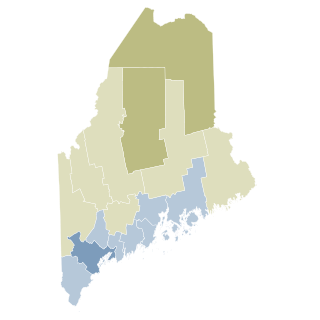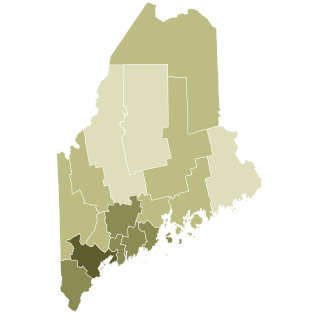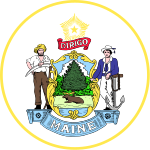
Matthew Dunlap is an American politician from Maine who has served as the Maine State Auditor since November, 2022, and previously from January to October, 2021. A Democrat, Dunlap served as Secretary of State of Maine from January 7, 2013, to January 4, 2021, and previously served in that same post from 2005 to 2011. In 2012, he sought to become his party's nominee to replace retiring Olympia Snowe, but lost in the primary to State Senator Cynthia Dill. Prior to his first election as secretary of state in 2005, he represented Old Town in the Maine House of Representatives for four terms beginning in 1996. On December 2, 2020, Dunlap was elected Maine State Auditor by the Maine Legislature and took office on January 4, 2021. Dunlap had to vacate the position after failing the exams needed to meet the requirements of the position the following October, and was replaced by Jacob Norton. He did later meet the requirements and was selected for the position again on November 14, 2022.
Same-sex marriage has been legally recognized in Maine since December 29, 2012. A bill for the legalization of same-sex marriages was approved by voters, 53–47 percent, on November 6, 2012, as Maine, Maryland and Washington became the first U.S. states to legalize same-sex marriage by popular vote. Election results were certified by the Maine Secretary of State's office and the Governor of Maine, Paul LePage, on November 29. Maine was the eighth U.S. state to legalize same-sex marriage.

Paul Richard LePage is American businessman and politician who served as the 74th governor of Maine from 2011 to 2019. A member of the Republican Party, he previously served as the mayor of Waterville, Maine, from 2004 to 2011 and as a city councilor for Waterville from 1998 to 2002.

Maine Question 1 was a voter referendum on an initiated state statute that occurred on November 6, 2012. The referendum was held to determine whether or not to legalize same-sex marriage. The referendum passed with a 53-47% vote legalizing same-sex marriage in Maine.
Mark W. Eves is an American politician and family counselor who served as a member of the Maine House of Representatives for the 146th district from 2008 to 2014. He was also a Democratic candidate in the 2018 Maine gubernatorial election.

Shenna Lee Bellows is an American politician and a non-profit executive director. On December 2, 2020, the Maine Legislature elected her to serve as the 50th Maine secretary of state. She was executive director of the Holocaust and Human Rights Center of Maine between 2018 and 2020, and she served as the executive director of the American Civil Liberties Union (ACLU) of Maine between 2005 and 2013.

Maine Question 1 (MQ1), "An Act To Prohibit the Use of Dogs, Bait or Traps When Hunting Bears Except under Certain Circumstances", was a citizen-initiated referendum measure in Maine, which was voted on in the general election of November 4, 2014. As the Maine Legislature declined to act on the proposed statute, it was automatically placed on the ballot. The proposal was defeated by 320,873 "No" votes to 279,617 "Yes".

Maine Question 1, "An Act To Strengthen the Maine Clean Election Act, Improve Disclosure and Make Other Changes to the Campaign Finance Laws", was a citizen-initiated referendum measure in Maine, which appeared on the November 3, 2015 statewide ballot. As the Maine Legislature did not exercise its ability to pass the bill on its own, it was placed on the ballot and approved by Maine voters.

Maine Question 1 was a people's veto referendum that appeared on the June 12, 2018 statewide ballot. It sought to reject a law passed by the Maine Legislature that suspended the implementation of ranked-choice voting, authorized by Maine voters in a previous referendum, for use in Maine elections until and if an amendment to the Maine Constitution is passed to expressly permit it; failing that, the law would be automatically repealed in 2021. It qualified because supporters of the original referendum collected the necessary number of signatures from registered Maine voters. This vote coincided with primary elections in which party nominees for governor, U.S. Senate, U.S. House, and the Maine Legislature were chosen through RCV to run in general elections on November 6.

Maine Question 5, formally An Act to Establish Ranked-Choice Voting, is a citizen-initiated referendum question that qualified for the Maine November 8, 2016 statewide ballot. It was approved by a vote of 52% in favor, 48% opposed. It sought to change how most Maine elections will be conducted from plurality voting to instant-runoff voting. It appeared on the ballot along with elections for President of the United States, Maine's two U.S. House seats, the legislature, five other ballot questions, and various local elections. The referendum was successful, making Maine the first state to use ranked choice voting for its federal elections.

Maine Question 1, "Do you want to reject the section of Chapter 399 of the Public Laws of 2011 that requires new voters to register to vote at least two business days prior to an election?", was a 2011 people's veto referendum that rejected a bill repealing Election Day voter registration in Maine. The vote was held on November 8, 2011 after being placed on the ballot due to supporters collecting the necessary number of signatures. The veto effort was successful, with 237,024 votes in favor of repeal to 155,156 against repeal.

Maine Question 4, formally An Act to Raise the Minimum Wage, is a citizen-initiated referendum question that appeared on the Maine November 8, 2016 statewide ballot. It sought to increase Maine's minimum wage from $7.50 per hour to $12 an hour by 2020, as well as increasing the minimum wage for tipped employees gradually to the same level by 2024. It would also index increases after 2024 to inflation. As the Maine Legislature and Governor Paul LePage declined to enact the proposal as written, it appeared on the ballot along with elections for President of the United States, Maine's two U.S. House seats, the Legislature, other statewide ballot questions, and various local elections. Efforts to place a competing, more moderate proposal alongside the citizen-initiated bill were unsuccessful.

Maine Question 3, formally An Act to Require Background Checks for Gun Sales, was a citizen-initiated referendum question that appeared on the Maine November 8, 2016 statewide ballot. It sought to require a background check for virtually all gun transfers in Maine, with some exceptions. As the Maine Legislature and Governor Paul LePage declined to enact the proposal as written, it appeared on the ballot along with elections for President of the United States, Maine's two United States House seats, the Maine Legislature, other statewide ballot questions, and various local elections.

In the context of public healthcare policy of the United States, the Medicaid coverage gap refers to uninsured people who do not qualify for marketplace assistance under the Affordable Care Act (ACA) and reside in states that have not adopted Medicaid expansion under the ACA. People within this categorization have incomes above the eligibility limits for Medicaid set by their state of residence but fall below the federal poverty line (FPL), resulting in deficient access to affordable health insurance. As of March 2023, an estimated 1.9 million Americans in 10 states are within the Medicaid coverage gap according to the Kaiser Family Foundation. Approximately 97 percent of this cohort lives in the Southern U.S., with a majority living in Texas and Florida; Texas has the largest population of people in the cohort, accounting for 41 percent of people in the coverage gap.

Maine Question 1, formally An Act to Legalize Marijuana, is a citizen-initiated referendum question that qualified for the Maine November 8, 2016 statewide ballot. It was qualified for the ballot after a Maine Superior Court judge ordered that petitions rejected by the Maine Secretary of State be reconsidered. The proposal sought to legalize the recreational use of marijuana in Maine for those over the age of 21, and institute a 10 percent tax on its sale. As the Maine Legislature and Governor Paul LePage declined to enact the proposal as written, it appeared on the ballot along with elections for President of the United States, Maine's two U.S. House seats, the Legislature, other statewide ballot questions, and various local elections.

Five referendums were held in Maine, United States on November 8, 2016 alongside state and national elections. All are citizen-initiated proposals, which cover:

Maine Question 2, formally entitled "An Act To Enhance Access to Affordable Health Care", was a citizen-initiated ballot measure that appeared on the November 7, 2017 statewide ballot in the State of Maine. Maine Question 2 sought to expand Medicaid eligibility under the terms of the Affordable Care Act. The measure passed.

Maine Question 1, formally An Act To Allow Slot Machines or a Casino in York County, was a citizen-initiated referendum question that appeared on the November 7, 2017, statewide ballot in Maine. It sought to award a license for the construction and operation of a casino in York County, Maine by a qualified entity as spelled out in the proposed law, with tax revenue generated by the casino to go to specific programs. The wording of the proposed law effectively permitted only one company, Capital 7, to be awarded the license. The ballot measure was defeated, with 83% of voters opposing it.

Maine Question 1 is a citizen-initiated referendum that appeared on the November 6, 2018 statewide ballot. It sought to implement a tax on higher incomes in Maine to fund in-home health care services for elderly and disabled Mainers, as well as to create a government board to administer the funds. The vote coincided with general elections for governor, U.S. Senate, U.S. House, the Maine Legislature, and other local elections. It qualified for the ballot due to supporters collecting signatures from registered Maine voters. It was defeated 62.86% to 37.14%.

2020 Maine Question 1 was a people's veto referendum that sought to reject a new law which eliminated religious and philosophical exemptions from school vaccination requirements and for employees of nursery schools and health care facilities. The question appeared on the statewide ballot on March 3, 2020, coinciding with the Democratic and Republican presidential primaries for the 2020 U.S. presidential election.















